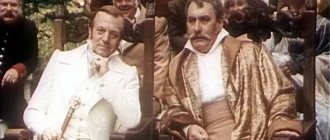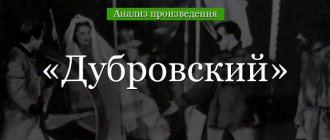- Essays
- On literature
- Pushkin
- Dubrovsky - a noble hero
We all love heroes who save other people and are ready to help at the most unexpected moment. But above all, we must be honest not only with others, but with ourselves. After all, if we are not honest with ourselves, if we lie to ourselves, then how can we be honest with others, much less demand the same from them?
Many people think that if we do a good deed, then we can call ourselves noble. But this, unfortunately, is not the case. Nobility is, above all, kindness towards others. If we do good for nothing, without demanding anything in return, only then can we say that we are noble people. Many people do good deeds just to become rich and famous. But alas, there are so few people left who really do not look for benefits in anything.
Many writers addressed this topic and one of them was A.S. Pushkin. He introduced to our attention Vladimir Dubrovsky, who became the main character of the story of the same name, which was published in 1841.
Not all people will agree that he is a noble man. This is why we need to remember the story of his life, which will help us understand everything. Our hero's father died due to the fault of his old friend Kiril Troekurov, who later took his house and lands. Dubrovsky was left with practically nothing. Despite this, he still has the most important thing - kindness, pride, honor and the duty to protect the people of his land. Many may argue that he could not have taken revenge, but left everything as it was. But no one thought that he was taking revenge not only for himself, but for the death of his father, for the people loyal to him to the last drop of blood.
If we talk about the author’s position, he is completely on the side of the main character. Using his example, he showed a man who, despite everything, remains on the side of justice, who is faithful to his oath and who fights against omnipotence, cruelty and humiliation of the weak. He showed that no conditions or circumstances can break a person, his views and positions, if he himself does not want it. Despite the difficult situation in life, our character remained a good person, although he had reasons to change.
This is why I believe that Vladimir Dubrovsky is a noble hero. Although he had negative sides, we can justify all this with his kindness, honesty, courage and nobility.
LiveInternetLiveInternet
“Nobility versus meanness” Essay for 6th grade.
(Based on the novel by A.S. Pushkin “Dubrovsky”)
Alexander Sergeevich Pushkin, hated all his life the emptiness, injustice, “savagery” of the nobility, and in his novel “Dubrovsky”, he vividly described and brought to the fore an ambitious representative of a purely provincial nobility, a noble rebel who suffered from his own class, young Dubrovsky.
Boyar Troekurov in the novel is described as a tyrant and a despot, and in the end, this leads to the fact that the old master Dubrovsky Andrei Gavrilovich dies. The master's estate illegally passes into the possession of Troyekurov.
And from this moment the main plot begins - the conflict. It develops and destroys the soul of young Dubrovsky, and now... a rebellion is brewing! The author himself, Alexander Sergeevich, idealized Vladimir Dubrovsky. Why? Because Pushkin imagined himself in the role of Dubrovsky, that is, a liberator fighting for truth and justice.
The author endowed Dubrovsky with all the features of a romantic, typical hero. He is smart and educated, handsome and brave, kind and noble, handsome, and most importantly, his relationship with the peasants is based on trust and devotion.
The peasants have long protested against the tyrant master Troyekurov, and their heartfelt cry finds a response in Dubrovsky’s heart. First of all, both the peasants and the young Vladimir Dubrovsky himself would like to take revenge on Troekurov for the death of Andrei Gavrilovich Dubrovsky. And secondly, both Vladimir and the peasants hate officials who can help and are ready to work only for rich and noble people, for those whose hands are “unclean” and who are considered local “idols.”
The rebellion brewing in the souls of the peasants always results in a real struggle. And since the novel is adventurous and adventurous, according to the rules of this genre, the uprising of the people is not open, but underground. And it all happens like this: an unknown group of noble robbers first robs and then completely burns down the landowner’s estate.
But Vladimir himself refuses to take revenge on Troyekurov, because he is in love with the daughter of his enemy. The author deliberately aggravates the conflict by describing the wedding of Masha (the daughter of master Troekurov) with the elderly Prince Vereisky, and most importantly, Masha’s father approved this wedding and enlisted support.
Vladimir is desperately trying to help his beloved and win her back... But he’s late! Masha got married, and Vladimir himself was wounded. The last plot seems to justify the fact that the rebel war has become widespread.
In the novel, Alexander Sergeevich describes in detail both the morals and life of the provincial nobility, while idealizing their moral principles and moral education. The author, line by line, contrasts in the novel: meanness - honesty, greed - generosity, wild life - restraint, and hatred - love...
What does the author reveal in this novel? He revealed the essence, parasitic and vile, of officials; their uselessness, perversity, cowardice, flattery! But nobility, as in a good fairy tale, always wins! Therefore, Alexander Sergeevich ends his novel with the group of robbers simply disappearing. But, there still remains a chance that if officials take power into their own hands again, a group of avengers will return and they will help the oppressed to regain freedom.
********
The theme of freedom in Pushkin's lyrics. An essay based on the works of Pushkin A.S.
********
“What is nobility?” Essay on the story “Dubrovsky” (methodological development).
What is NOBILITY?
Nobility is…?….
It is often believed that robbers are immoral people who do not know what honor and dignity are. However, in A.S. Pushkin’s story “Dubrovsky,” the robber Vladimir, one of the few, has a nobility of soul. Having witnessed arbitrariness, having decided ...?..., he chooses not the most correct path - the path of revenge, but his courage evokes respect: ...?.... Even though he did not emerge victorious, his courage, nobility, and determination cannot but arouse sympathy.
The actions of the “noble” nobleman Troekurov speak of his ...?... and ...?... . He …?… . He does not care about the fate of ...?..., who ...?.... Next to Troekurov, the noble Vladimir looks even prettier.
According to those around him, Dubrovsky the robber “is distinguished by courage and some kind of generosity”; they said that he only attacked ...?.... Having met a French teacher, Dubrovsky...?....
Once in Troyekurov's house, having fallen in love with Masha, Vladimir refuses... He is extremely honest in his relationship with his beloved: ...?... . Even in comparison with Masha’s husband, Prince Vereisky, Dubrovsky...?....
You can be rich, noble, omnipotent, but no amount of money can buy honor, dignity, breadth of soul and nobility, which is manifested in Dubrovsky in...?....
What is NOBILITY?
Nobility is…?….
It is often believed that robbers are immoral people who do not know what honor and dignity are. However, in A.S. Pushkin’s story “Dubrovsky,” the robber Vladimir, one of the few, has a nobility of soul. Having witnessed arbitrariness, having decided ...?..., he chooses not the most correct path - the path of revenge, but his courage evokes respect: ...?.... Even though he did not emerge victorious, his courage, nobility, and determination cannot but arouse sympathy.
The actions of the “noble” nobleman Troekurov speak of his ...?... and ...?... . He …?… . He does not care about the fate of ...?..., who ...?.... Next to Troekurov, the noble Vladimir looks even prettier.
According to those around him, Dubrovsky the robber “is distinguished by courage and some kind of generosity”; they said that he only attacked ...?.... Having met a French teacher, Dubrovsky...?....
Once in Troyekurov's house, having fallen in love with Masha, Vladimir refuses... He is extremely honest in his relationship with his beloved: ...?... . Even in comparison with Masha’s husband, Prince Vereisky, Dubrovsky...?....
You can be rich, noble, omnipotent, but no amount of money can buy honor, dignity, breadth of soul and nobility, which is manifested in Dubrovsky in...?....
What is NOBILITY?
Nobility is…?….
It is often believed that robbers are immoral people who do not know what honor and dignity are. However, in A.S. Pushkin’s story “Dubrovsky,” the robber Vladimir, one of the few, has a nobility of soul. Having witnessed arbitrariness, having decided ...?..., he chooses not the most correct path - the path of revenge, but his courage evokes respect: ...?.... Even though he did not emerge victorious, his courage, nobility, and determination cannot but arouse sympathy.
The actions of the “noble” nobleman Troekurov speak of his ...?... and ...?... . He …?… . He does not care about the fate of ...?..., who ...?.... Next to Troekurov, the noble Vladimir looks even prettier.
According to those around him, Dubrovsky the robber “is distinguished by courage and some kind of generosity”; they said that he only attacked ...?.... Having met a French teacher, Dubrovsky...?....
Once in Troyekurov's house, having fallen in love with Masha, Vladimir refuses... He is extremely honest in his relationship with his beloved: ...?... . Even in comparison with Masha’s husband, Prince Vereisky, Dubrovsky...?....
You can be rich, noble, omnipotent, but no amount of money can buy honor, dignity, breadth of soul and nobility, which is manifested in Dubrovsky in...?....
What is NOBILITY?
Nobility is…?….
It is often believed that robbers are immoral people who do not know what honor and dignity are. However, in A.S. Pushkin’s story “Dubrovsky,” the robber Vladimir, one of the few, has a nobility of soul. Having witnessed arbitrariness, having decided ...?..., he chooses not the most correct path - the path of revenge, but his courage evokes respect: ...?.... Even though he did not emerge victorious, his courage, nobility, and determination cannot but arouse sympathy.
The actions of the “noble” nobleman Troekurov speak of his ...?... and ...?... . He …?… . He does not care about the fate of ...?..., who ...?.... Next to Troekurov, the noble Vladimir looks even prettier.
According to those around him, Dubrovsky the robber “is distinguished by courage and some kind of generosity”; they said that he only attacked ...?.... Having met a French teacher, Dubrovsky...?....
Once in Troyekurov's house, having fallen in love with Masha, Vladimir refuses... He is extremely honest in his relationship with his beloved: ...?... . Even in comparison with Masha’s husband, Prince Vereisky, Dubrovsky...?....
You can be rich, noble, omnipotent, but no amount of money can buy honor, dignity, breadth of soul and nobility, which is manifested in Dubrovsky in...?....
A. S. Pushkin, who all his life hated the injustice, emptiness and “savagery” of the nobility, in the novel “Dubrovsky” brought to the fore one of the representatives of the provincial nobility - an ambitious, noble rebel who suffered from his own class, young Dubrovsky. The tyranny and despotism of the noble master Troekurov leads to the fact that the old master Andrei Gavrilovich Dubrovsky dies. His estate is illegally awarded to Troekurov.
From this moment on, a conflict develops; a rebellion is brewing in the souls of Dubrovsky’s peasants. Young Vladimir Dubrovsky is idealized by Pushkin. This is how he sees a hero-liberator, a fighter for truth and justice. The young nobleman is endowed with the features of a typical romantic hero: smart, educated, noble, brave, kind, stately, handsome. His relationship with the peasants is built on loyalty and trust. The peasants' protest against Troekurov's tyranny finds a response in Dubrovsky's heart. They are driven by a sense of revenge for the death of Andrei Gavrilovich Dubrovsky, they hate government officials who can only work for rich, dishonest local “idols”. Rebellion in the soul of the people almost always results in real struggle. Therefore, according to the laws of the adventure genre, the popular uprising takes on an underground character, an unknown gang of noble robbers robs and burns the landowners' estates. Vladimir Dubrovsky is in love with the daughter of his enemy, so he refuses revenge on Troekurov. Pushkin aggravates the conflict with the wedding of Masha Troekurova and the elderly Prince Vereisky and the support of this marriage by the girl’s father. Dubrovsky desperately tries to win back his love, but is too late. Masha is married, Dubrovsky is wounded. This last detail serves as a plot justification for the rebel war to take on a massive scale. A. S. Pushkin depicted the life and customs of the provincial nobility with the idealized moral principles of the ancient nobility. He contrasted honesty with meanness, generosity with greed, love with hatred, restraint with revelry. The novel reveals the parasitic essence of bureaucracy, its uselessness, cowardice and perversity. Goodness and nobility, as in fairy tales, must win, so Pushkin ends the novel with the disappearance of the gang of robbers, leaving a chance that when the time comes, they will again defend the oppressed.
Related materials:
- REFLECTION ABOUT TRUE VALUES (based on the poem by N. A. Zabolotsky “Don’t let your soul be lazy”) - .
- DIFFICULTIES OF THE POST-WAR TIME (based on the story by V. G. Rasputin “French Lessons”) -.
- THE ROLE OF THE TEACHER IN THE LIFE OF A CHILD (based on the story by V. G. Rasputin “French Lessons”) -.
- WHAT IS THE EDUCATIONALITY OF M. M. PRISHVIN’S FAIRY TALE “THE PANTRY OF THE SUN” - .
- WAYS OF ridiculing VICES AND DISADVANTAGES (according to the stories of A.P. Chekhov) -.
Nobility versus meanness
A.S. Pushkin, who all his life hated the injustice, emptiness and “savagery” of the nobility, in the novel “Dubrovsky” brought to the fore one of the representatives of the provincial nobility - an ambitious, noble rebel who suffered from his own class, young Dubrovsky.
The tyranny and despotism of the noble master Troekurov leads to the fact that the old master Andrei Gavrilovich Dubrovsky dies. His estate is illegally awarded to Troekurov. From this moment on, a conflict develops, in the souls of Dubrovsky’s peasants a
riot. Young Vladimir Dubrovsky is idealized by Pushkin.
This is how he sees a hero-liberator, a fighter for truth and justice. The young nobleman is endowed with the features of a typical romantic hero: smart, educated, noble, brave, kind, stately, handsome. His relationship with the peasants is built on loyalty and trust.
The peasants' protest against Troekurov's tyranny finds a response in Dubrovsky's heart. They are driven by a feeling of revenge for the death of Andrei Gavrilovich Dubrovsky, they hate government officials who can only work for rich, dishonest local “idols”.
Riot in
the soul of the people almost always “results in real struggle. Therefore, according to the laws of the adventure genre, the popular uprising takes on an underground character, an unknown gang of noble robbers robs and burns the landowners' estates. Vladimir Dubrovsky is in love with the daughter of his enemy, so he refuses revenge on Troekurov.
Pushkin aggravates the conflict with the wedding of Masha Troekurova and the elderly Prince Vereisky and the support of this marriage by the girl’s father. Dubrovsky desperately tries to win back his love, but is too late. Masha is married, Dubrovsky is wounded.
This last detail serves as a plot justification for the rebel war to take on a massive scale.
A. S. Pushkin depicted the life and customs of the provincial nobility with the idealized moral principles of the ancient nobility. He contrasted honesty with meanness, generosity with greed, love with hatred, restraint with revelry.
The novel reveals the parasitic essence of bureaucracy, its uselessness, cowardice and perversity. Goodness and nobility, as in fairy tales, must win, so Pushkin ends the novel with the disappearance of the gang of robbers, leaving a chance that when the time comes, they will again defend the oppressed.


